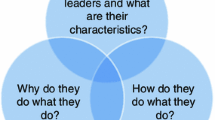Abstract
This paper offers an alternative to deontological and utilitarian approaches to making ethical decisions and taking good actions by organisational leaders. It argues that the relational and context-dependent nature of leadership necessitates reference to an ethical approach which explicitly takes these aspects into account. Such an approach is offered in the re-conceptualisation of ethical action on the part of leaders as a process of “coming into right relation” vis-à-vis those affected by their decisions and actions. Heidegger’s notion of “dwelling” is explored as a means of “coming into right relation”. Three aspects of dwelling: “staying with”, “comportment” and “active engagement” are described and ways in which they might be practically enacted by leaders are suggested. The paper concludes by reflecting on the ways adopting a “dwelling” approach to resolving ethical issues implies a re-conceptualisation of leadership itself.
Similar content being viewed by others
References
Aristotle: 1976, The Nicomachean Ethics, translated by J. Thomson, revised with note and appendices by H. Tredennick, introduction and bibliography by J. Barnes, London: Penguin
B. M. Bass (1985) Leadership and Performance Beyond Expectations Free Press New York
B. M. Bass B. J. Avolio (1993) ‘Transformational Leadership: A Response to Critiques’ M. M. Chemers R. Ayman (Eds) Leadership Theory and Research: Perspectives and Qualitys Academic Press San Diego, CA 49–80
J. R. Boatright (1995) ArticleTitle‘Aristotle Meets Wall Street: The Case for Virtue in Business Ethics’ Business Ethics Quarterly 5 IssueID2 353–359
J. M. Burns (1978) Leadership Harper & Row New York
J. Cheney A. Weston (1999) ArticleTitle‘Evironmental Ethics as Environmental Etiquette: Towards an Ethics Based Epistemology’ Environmental Ethics 21 120–136
Cheney, Jim: 2002, ‘Truth, Knowledge and the Wild World’ www.http://waukesha.uwc.edu/phi/jcheney
J. B. Ciulla (1995) ArticleTitle‘Leadership ethics: Mapping the territory’ Business Ethics Quarterly 5 5–24
J Collier (1995) ArticleTitle‘The Virtuous Organisation’ Business Ethics: A European Review 4 IssueID3 143–149
S. Cummings (2000) ‘Resurfacing an Aesthetics of Existence as an Alternative to Business Ethics’ S. Linstead H. Hopfl (Eds) The Aesthetics of Organisation Sage London 212–227
T. Donaldson P. Werhane (1999) Ethical Issues in Business: A Philosophical Approach EditionNumber6 Prentice Hall Upper Saddle River, NJ
W. Drath (2001) The Deep Blue Sea Jossey-Bass San Francisco
B. Foltz (1995) Inhabiting the Earth: Heidegger, Environmental Ethics, and the Metaphysics of Nature Humanity Books New York
Gemmill, G. and J. Oakley: 1992, ‘Leadership: An Alienating Social Myth?’ Human Relations, 45(2), 113–129. Reproduced in K. Grint (1997) Leadership: Classical, Contemporary and Critical Approaches, (Oxford: Oxford University Press), pp. 272–288
C Gilligan (1982) In a Different Voice: Psychological Theroy and Women’s Development Harverd University Press Cambridge MA
Goodman Elgin (1988) Reconceptualisation in Philosophy and other Sciences Hackett Publishing Indianapolis
R. K. Greenleaf (1977) Servant Leadership Paulist Press New York
InstitutionalAuthorNameHartman (1998) ArticleTitle‘The Role of Character in Business Ethics’ Business Ethics Quarterly 8 IssueID3 547–559
M. Heidegger (1962) Being and Time Blackwell Oxford
Heidegger, M.: 1971, ‘Building Dwelling Thinking’ in Poetry, Language, Thought (Albert Hofstadter, trans) New York: Harper Colophon, pp. 145–161
M. Heidegger (2002) ‘On the Essence of Truth’ David Farrell Krell (Eds) Basic Writings EditionNumber6 Routledge London 111–138
R. J. House (1976) ‘A 1976 Theory of Charismatic Leadership’ J. G. Hunt L. L. Larson (Eds) Leadership: The Cutting Edge Southern Illinois University Press Carbondale 189–207
R. J. House R. N. Aditya (1997) ArticleTitle‘The Social and Scientific Study of Leadership: Quo Vadis?’ Journal of Mangement 23 409–473
A. MacIntyre (1985) After Virtue EditionNumber2 Duckworh London
J. H. Monast (1994) ArticleTitle‘What Is (and Isn’t) the Matter with “What’s the Matter...”’ Business Ethics Quarterly 4 IssueID4 499–512
G. P. Northouse (2004) Leadership: Theory and Practice EditionNumber3 Sage London
C. W. Pollard (1996) ‘The Leader Who Serves’ F. Hesselbein M. Goldsmith R. Beckhard (Eds) The Leader of the Future New Visions Strategies and Practices for the Next Era San Francisco Jossey Bass
L. C. Spears (Eds) (1995) Reflections on Leadership John Wiley and Sons New York
A. Stark (1993) ArticleTitle‘What’s the Matter with Business Ethics?’ Harvard Business Review 71 IssueID3 38–48
J. T. Whetstone (2001) ArticleTitle‘How Virtue Fits Within Business Ethics’ Journal of Business Ethics 33 101–114 Occurrence Handle10.1023/A:1017554318867
M. Wood (2005) ArticleTitle‘The Fallacy of Misplaced Leadership’ Journal of Management Studies 42 IssueID6 1101–1121 Occurrence Handle10.1111/j.1467-6486.2005.00535.x
E. M. Zimmerman (2000) ‘The Role of Spiritual Discipline in Learning to Dwell on Earth’ D. Seamon R. Mugerauer (Eds) Dwelling, Place and Environment: Towards a Phenomenology of Person and World Krieger Publishing Co Malabar, FL 247–256
Author information
Authors and Affiliations
Corresponding author
Rights and permissions
About this article
Cite this article
Ladkin, D. When Deontology and Utilitarianism Aren’t Enough: How Heidegger’s Notion of “Dwelling” Might Help Organisational Leaders Resolve Ethical Issues. J Bus Ethics 65, 87–98 (2006). https://doi.org/10.1007/s10551-006-0019-0
Issue Date:
DOI: https://doi.org/10.1007/s10551-006-0019-0




